★★
“A blandly over-cooked platter of spaghetti”
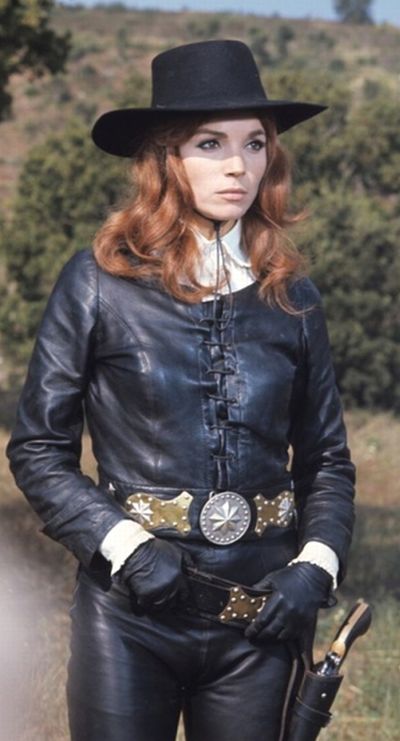 This is virtually unique, in being almost the only spaghetti Western with a female lead, and certainly unique in being the only one directed by a woman. Unfortunately, beyond these novelty aspects, it’s really not very good. Indeed, the overall attitude on view here is so remarkably retrograde, the gender of its director would likely be a surprise, if you didn’t know what it was going in. The film certainly keeps it quiet, disguising Wertmüller – who, seven years later, would become the first woman ever to receive a Best Director Oscar nomination, for Seven Beauties – under the pseudonym of “Nathan Wich”. Whose brother is called Sam, presumably.
This is virtually unique, in being almost the only spaghetti Western with a female lead, and certainly unique in being the only one directed by a woman. Unfortunately, beyond these novelty aspects, it’s really not very good. Indeed, the overall attitude on view here is so remarkably retrograde, the gender of its director would likely be a surprise, if you didn’t know what it was going in. The film certainly keeps it quiet, disguising Wertmüller – who, seven years later, would become the first woman ever to receive a Best Director Oscar nomination, for Seven Beauties – under the pseudonym of “Nathan Wich”. Whose brother is called Sam, presumably.
The anonymity is perhaps because she wasn’t originally intended to direct. She took over from Piero Cristofani, some sources say as a favour to leading lady Martinelli. Wertmüller then rewrote the script to reduce Woods’s role, with whom she reportedly had on-set battles. A bit like the more recent, yet similarly cursed Western, Jane Got a Gun, it’s perhaps remarkable the makers managed to come up with a finished product at all. And also similarly, the behind-the-scenes saga is likely a good deal more interesting than said finished product.
There’s no denying Martinelli looks the part, as renegade, gambler and outlaw Belle Starr. She falls for the charms of fellow poker player Larry Blackie (Eastman), and they begin a tempestuous romance, which my wife sarcastically described as “Hit me! Kiss me! Rape me! Love me!” It’s this aspect which seems especially at odds with the rest of Wertmüller’s filmography, much of which is populated by strongly feminist characters. Here, Belle seems both to crave Blackie’s attentions and loathe him with a passion. She declines an offer to bring her on board for his planned robbery of a diamond shipment, instead setting about assembling her own crew, which will beat him to the loot.
Before we get to that, there’s a long, long flashback, covering Starr’s life to that point. In its entirety. In real-time. Or perhaps it just seems that way. It certainly brings the story grinding to a halt. We see how she was brought up by an abusive foster uncle, from whom she was rescued by the outlaw Cole Harvey (Woods). He tries to rape her – yeah, you may be forgiven for detecting a bit of a theme here – and is killed for his pains, which helps set Belle off on her life of crime, poker and questionable romantic choices.
Beyond Martinelli’s look, there’s very little to recommend this, particularly for the first hour – it does pick up somewhat late, as Belle and Larry simultaneously stage their robbery attempts. Until then, even getting beyond the dubious sexual politics on view, this is poorly written, and just not very interesting. Wertmüller can’t even shoot a poker game properly; she’ll show you the cards, and half the time, you don’t know whose they are. Sad though it to say this, you can certainly understand why it was a case of “one and done,” both for spaghetti Western heroines, and Wertmüller’s genre efforts.
Dir: Lina Wertmüller
Star: Elsa Martinelli, George Eastman, Robert Woods, Francesca Righini





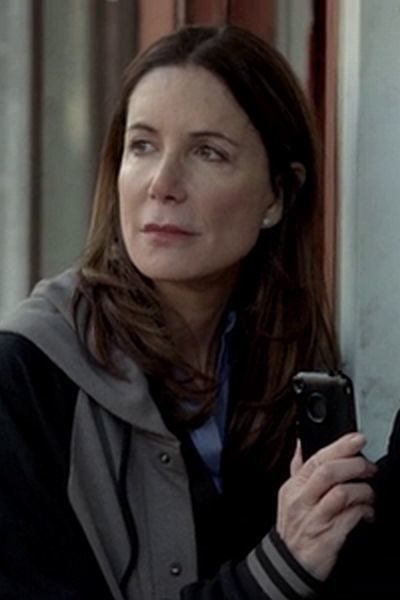 Ann Willis (Robbins) is a single mother, working as a waitress and trying to keep family together after the death of her husband from lung cancer. To help out, son David (Abrahamson) abandons his plans to attend college and gets a job in a local factory. But he falls in with some questionable company there and, lured by the prospect of easy money, starts dealing drugs for the local mobsters, run by Canarsie. Things go from bad to worse after his supposed “friend” Mike (Falahee) frames him for the disappearance of some product, and things end with David’s dead body floating in the river, having been beaten to death by his associates. The cops, and in particular, Detective Frank Hogan (Baldwin), investigate – but to be honest, aren’t particularly interested in one drug-dealer being killed.
Ann Willis (Robbins) is a single mother, working as a waitress and trying to keep family together after the death of her husband from lung cancer. To help out, son David (Abrahamson) abandons his plans to attend college and gets a job in a local factory. But he falls in with some questionable company there and, lured by the prospect of easy money, starts dealing drugs for the local mobsters, run by Canarsie. Things go from bad to worse after his supposed “friend” Mike (Falahee) frames him for the disappearance of some product, and things end with David’s dead body floating in the river, having been beaten to death by his associates. The cops, and in particular, Detective Frank Hogan (Baldwin), investigate – but to be honest, aren’t particularly interested in one drug-dealer being killed. Stumbled across this low-budget horror flick almost by accident when I was Googling the similarly-titled but very different,
Stumbled across this low-budget horror flick almost by accident when I was Googling the similarly-titled but very different,  Yoga instructor May (Biel) is delighted when she finally tracks down her long-lost biological sister, Shiva (Mamet) whom she has never met. However, the reunion is soured because May discovers the abusive relationship in which Shiva is embroiled. Worse is to come, as she finds out that Shiva is actually a hooker, and her significant other, Cody (Anderson), is more pimp than boyfriend. May’s efforts to help her sibling run into stormy water – not just from Cody, but also her own boyfriend, Dex (Gathegi) and adopted mother, who think Shiva and Cody are just shaking May down. Eventually, the point comes where May has to come out of this middle-class comfort-zone, because the downward dog position isn’t going to help her and Shiva escape their increasingly perilous situation.
Yoga instructor May (Biel) is delighted when she finally tracks down her long-lost biological sister, Shiva (Mamet) whom she has never met. However, the reunion is soured because May discovers the abusive relationship in which Shiva is embroiled. Worse is to come, as she finds out that Shiva is actually a hooker, and her significant other, Cody (Anderson), is more pimp than boyfriend. May’s efforts to help her sibling run into stormy water – not just from Cody, but also her own boyfriend, Dex (Gathegi) and adopted mother, who think Shiva and Cody are just shaking May down. Eventually, the point comes where May has to come out of this middle-class comfort-zone, because the downward dog position isn’t going to help her and Shiva escape their increasingly perilous situation.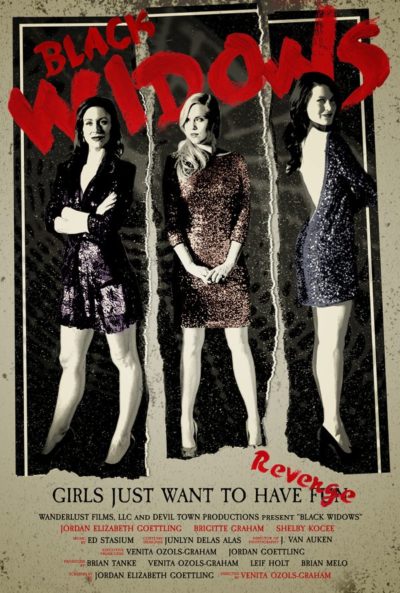 Three women friends – Darcy (Elizabeth), Nora (Graham) and Olivia (Kocee) – are all having shitty luck with their relationships. Olivia is in the middle of an ugly divorce from Adam. Nora’s boyfriend Ryan is a control freak. And while Darcy’s new friend Blair (Brown) initially seems fine, he turns out to be the worst of them all. After he refuses to take no for an answer, the trio decide revenge is a dish best served naked in the middle of the desert. Unfortunately for him, Blair ends up lacking a pulse. Unfortunately for the film, it takes forever to get to this point, and for the vast majority of its running-time the promised “dark comedy” is neither dark nor comedic.
Three women friends – Darcy (Elizabeth), Nora (Graham) and Olivia (Kocee) – are all having shitty luck with their relationships. Olivia is in the middle of an ugly divorce from Adam. Nora’s boyfriend Ryan is a control freak. And while Darcy’s new friend Blair (Brown) initially seems fine, he turns out to be the worst of them all. After he refuses to take no for an answer, the trio decide revenge is a dish best served naked in the middle of the desert. Unfortunately for him, Blair ends up lacking a pulse. Unfortunately for the film, it takes forever to get to this point, and for the vast majority of its running-time the promised “dark comedy” is neither dark nor comedic. It kinda works, mostly for the dynamics between the trio of leading ladies. At first, Cali’s approach seems sensible, arguably a legitimate way to make the best of a bad situation. However, a change in the scenario shifts things seismically, and even the toughest of her supporters would have to admit an unpleasant streak of psychopathy is opened in her make-up. Evil sometimes wears a pretty face, and Turshen reminded me more than a little of Denise Richards in Wild Things – manipulative and . Less successful, to the point of entire irrelevance, is the boyfriend who shows up and yells for a bit. I suspect, given the slight running time of 75 minutes, his presence may have been a late-added necessity in order to reach feature length.
It kinda works, mostly for the dynamics between the trio of leading ladies. At first, Cali’s approach seems sensible, arguably a legitimate way to make the best of a bad situation. However, a change in the scenario shifts things seismically, and even the toughest of her supporters would have to admit an unpleasant streak of psychopathy is opened in her make-up. Evil sometimes wears a pretty face, and Turshen reminded me more than a little of Denise Richards in Wild Things – manipulative and . Less successful, to the point of entire irrelevance, is the boyfriend who shows up and yells for a bit. I suspect, given the slight running time of 75 minutes, his presence may have been a late-added necessity in order to reach feature length.
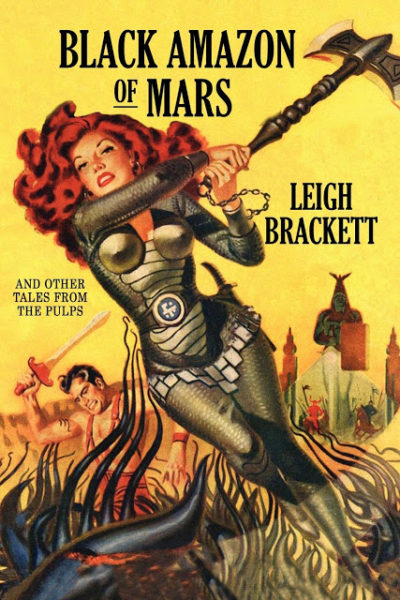 Normally, I like to start a series at the beginning. But I chose to read this second novella of Brackett’s Eric John Stark series, as my long-awaited first introduction to her work, because Amazon offered me the chance to read it for free on my Kindle app. (And yes, I’ll definitely be buying a paper copy!) That means there are unanswered questions here about Stark’s origins and background, and about the Martian world –what kind of “beasts” are used as mounts here, for instance, or what the economic base of a city-state like Kushat is– that probably have answers in the first book, or earlier stories. (The author wrote about the character in both formats, and not all of the corpus is still in print.)
Normally, I like to start a series at the beginning. But I chose to read this second novella of Brackett’s Eric John Stark series, as my long-awaited first introduction to her work, because Amazon offered me the chance to read it for free on my Kindle app. (And yes, I’ll definitely be buying a paper copy!) That means there are unanswered questions here about Stark’s origins and background, and about the Martian world –what kind of “beasts” are used as mounts here, for instance, or what the economic base of a city-state like Kushat is– that probably have answers in the first book, or earlier stories. (The author wrote about the character in both formats, and not all of the corpus is still in print.)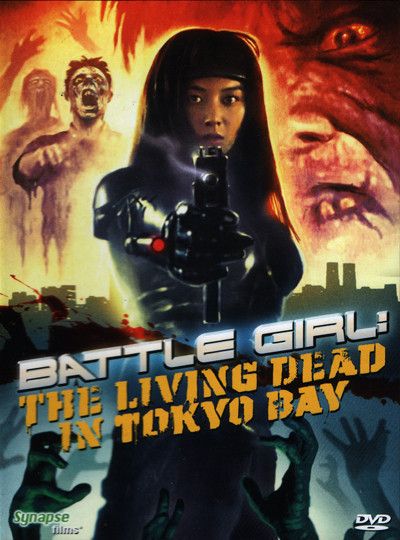 A meteor crashes into Tokyo Bay, creating a cloud of “cosmo-amphetamine” that infects everyone in the area. When they die, that drug immediately takes over, bringing them back to life as flesh-eating zombies. Colonel Kirihara is leading the rescue mission, and sends his daughter, K-ko (Suzuki) into the contaminated zone to scope things out. She finds that one of his underling, Captain Fujioka, is using the chaos to carry out human experiments, deliberately infecting survivors with the cosmo-amphetamine, in order to turn them into an unstoppable force of undead soldiers. He’s not willing to let anyone get out alive, least of all K-ko. Fortunately, her father gave her a battle suit, which helps to even the odds against the living dead army she faces.
A meteor crashes into Tokyo Bay, creating a cloud of “cosmo-amphetamine” that infects everyone in the area. When they die, that drug immediately takes over, bringing them back to life as flesh-eating zombies. Colonel Kirihara is leading the rescue mission, and sends his daughter, K-ko (Suzuki) into the contaminated zone to scope things out. She finds that one of his underling, Captain Fujioka, is using the chaos to carry out human experiments, deliberately infecting survivors with the cosmo-amphetamine, in order to turn them into an unstoppable force of undead soldiers. He’s not willing to let anyone get out alive, least of all K-ko. Fortunately, her father gave her a battle suit, which helps to even the odds against the living dead army she faces.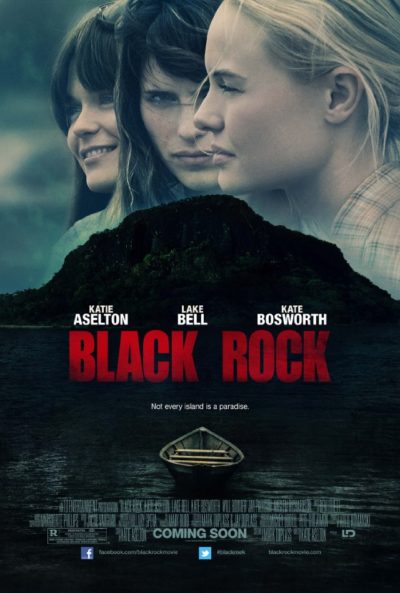 Maybe I’m getting old and deaf. Or maybe it’s just not a good idea to have dialogue that appears to consist largely of characters yelling (or whispering) over the top of each other. Either way, probably a negative the muddy audio is the main thing I remember about this survival horror film. Childhood friends Sarah (Bosworth), Abby (Aselton) and Lou (Bell) re-unite for a weekend on an island near where they grew up. There’s some reluctance here, Abby and Lou not having been on speaking terms for some years, due to the latter having slept with the former’s boyfriend years previously. The island is supposedly deserted, so they’re surprised to encounter three men hunting there, one of whom is known to Lou. A drink leads to another, and before you know it, Abby has fended off advances, in lethal fashion. The two survivors don’t take kindly to this, and begin hunting the trio to take revenge for their friend.
Maybe I’m getting old and deaf. Or maybe it’s just not a good idea to have dialogue that appears to consist largely of characters yelling (or whispering) over the top of each other. Either way, probably a negative the muddy audio is the main thing I remember about this survival horror film. Childhood friends Sarah (Bosworth), Abby (Aselton) and Lou (Bell) re-unite for a weekend on an island near where they grew up. There’s some reluctance here, Abby and Lou not having been on speaking terms for some years, due to the latter having slept with the former’s boyfriend years previously. The island is supposedly deserted, so they’re surprised to encounter three men hunting there, one of whom is known to Lou. A drink leads to another, and before you know it, Abby has fended off advances, in lethal fashion. The two survivors don’t take kindly to this, and begin hunting the trio to take revenge for their friend. About to get married, Kira (Riddervold) and Marco (Campos) head out for a last quiet weekend together, at a luxurious cabin in the woods. Unfortunately, they become the target for the local rednecks and their kidnapping plot. This goes wrong, leaving Marco shot dead and Kira raped, then shot dead. Both bodies are buried in the woods, but – what are the odds? – it’s at the base of a tree where a native American woman was similarly slain by American soldiers in the mid-19th century. The spirit of that victim resurrects Kira out of her grave, in order for her to take her vengeance on those responsible.
About to get married, Kira (Riddervold) and Marco (Campos) head out for a last quiet weekend together, at a luxurious cabin in the woods. Unfortunately, they become the target for the local rednecks and their kidnapping plot. This goes wrong, leaving Marco shot dead and Kira raped, then shot dead. Both bodies are buried in the woods, but – what are the odds? – it’s at the base of a tree where a native American woman was similarly slain by American soldiers in the mid-19th century. The spirit of that victim resurrects Kira out of her grave, in order for her to take her vengeance on those responsible.